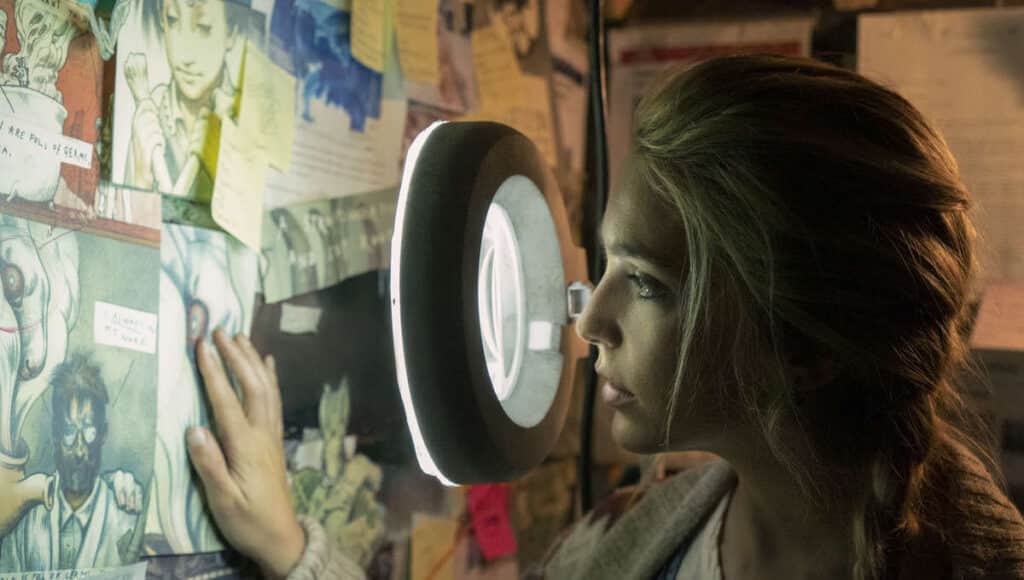Read also:
How to Watch FX Live Without CableHow To Watch AMC Without CableHow to Watch ABC Without CableHow to Watch Paramount Network Without CableGillian Flynn’s new Prime series is an ambitious saga that offers loads to chew on, assuming you can handle the bleakness of it all.
You have to give it this: Utopia feels different than most everything available on TV or streaming these days.
This is a bit of surprise considering it’s an adaptation of a short-lived British series. In this American version helmed by Gillian Flynn (who penned every episode), the action also revolves around a cult-favorite comic, Dystopia. The comic concerns the attempts by the nefarious Mr. Rabbit to sow death and chaos worldwide and a little girl, Jessica Hyde, whom Mr. Rabbit seems especially fixated on. Amongst a certain sect of Dystopia fans, the comic has gone from engaging to a sort of prophecy. For them, news of a sequel to Dystopia, titled Utopia, sends them into a frenzy.
When an announcement comes that the only copy will be sold at Fringe Con in Chicago, five such believers make a plan to get the book. Three of them are true believers. There’s Wilson Wilson (Desmin Borges), a doomsday prepper from a long line of conspiracy theorists; Samantha (Jessica Rothe), a do-gooder tired of reacting instead of acting on crises; and Becky (Ashleigh LaThrop), a kind-hearted, naïve woman with personal reasons to pursue Utopia. On the other hand is Ian (Dan Byrd), a nonbeliever who’s just happy to spend time with Becky. Then there’s Grant (Javon Walton), a guy who’s constructed a false identity to impress his online friends.
Unfortunately, the comic has also attracted the attention of some far rougher types such as Arby (Christopher Denham) and Rod (Michael B. Woods). There’s also a virus possibly connected to Dr. Kevin Christie’s (John Cusack) brand new synthetic meat that only seems to infect children. As it so happens, it seems to be a virus Dr. Michael Stearns (Rainn Wilson) has discovered and cured in Peru years before. Oh, and then there’s the matter of a woman who runs around and calls herself Jessica Hyde (Sasha Lane).

If that seems like a lot of plot, well… it is. However, rather than make Utopia feel overloaded and cumbersome, the plot is one of its best weapons. Little of the oft-characteristic bloat of streaming originals can be found in Utopia. The series moves nimbly between subplots in the seven (of eight) episodes provided for review. Flynn and her team have figured out the beats well, connecting just enough disparate parts in each episode without tipping their full hand too early.
Evidence of that can be found in one’s reaction to the end of episode seven. So many of the story’s mysteries seem solved or obvious at that moment, yet the doubts, fears of red herrings, or details missed remain strong enough that it feels like torture to not see the last episode. That finale could upend the whole affair and leave the viewer feeling empty and disappointed. (Enough remains unaddressed that the possibility of either obvious reveals or impossible-to-anticipate twists looms.) However, at the close of the penultimate episode, Flynn and directors Toby Haynes, Susanna Fogel, and J.D. Dillard seem to guide the show to its conclusion quite assuredly.
This isn’t to say Utopia will be for everyone. It’s frequently and brutally violent for one thing. If one were to keep a tally of headshots alone, they’d be well into double digits by the close of episode one. Gunshot wounds are hardly the only way blood is shed either: Stabbing, gouging, slicing, and bludgeoning all get their chance to create some splatter. The deaths may prove even more uncomfortable given the victims and the casualness of execution.
Flynn and her team have figured out the beats well, connecting just enough disparate parts in each episode without tipping their full hand too early.
Also possibly making some want to skip the whole affair are the unnervingly nearly ripped-from-the-headlines plot points and themes. A building pandemic, a government that seems too slow to act, and corporations stepping into the void with unknown deeper intentions stand out. There are also mass shootings, a fail son (Cory Michael Smith) who resembles Jared Kushner too much to be an accident, talk of weather catastrophes, and the show’s somewhat stilted critiques of overt phone usage. Despite a cockeyed sense of humor, Utopia has a bleak, bleak core, one that can leave your stomach tied in knots at the end of every episode.
Those that do hang around will likely do in so in no small part due to the performances. Of the core five, Walton stands out as feeling particularly naturalistic. His role easily could have toppled into either precociousness or bland childishness, but he navigates those poles quite well. It also feels great to have Cusack back in something well done. He plays Dr. Christie as a benignly messianic figure who shoots through even the most innocuous scenes with a sense of dread. Denham operates in a similar register as Arby. He adds in a persnickety quality that first reads as obsessive attention to detail. Over time, it becomes increasingly like a child’s attempts to control what little they can.
That sense of evolution is probably Utopia’s most defining feature. The ground is constantly shifting beneath the show’s feet be it through characters’ actions and motivations. The plot reveals also build and change the narrative multiple times, and for those who can stomach it, Utopia offers plenty to recommend itself.
Utopia hits Amazon Prime this Friday, September 25.